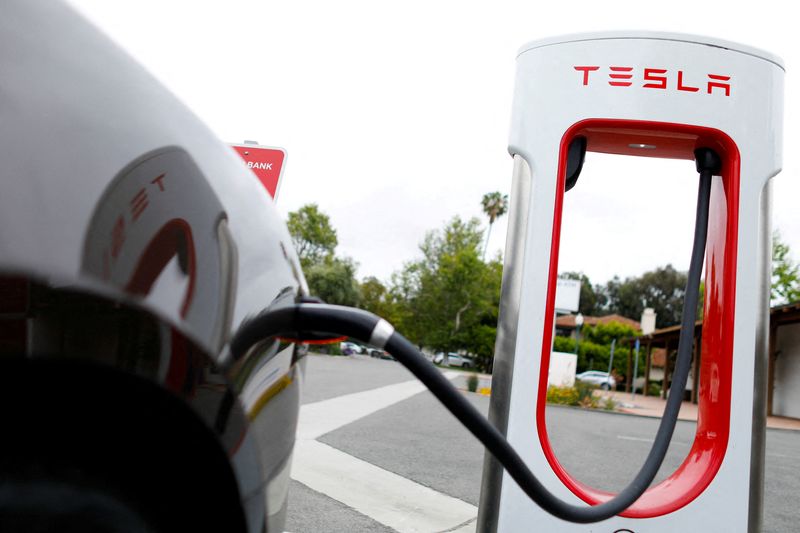On Monday, RBC (TSX:RY) Capital Markets highlighted potential regulatory changes that could favorably impact Tesla Inc (NASDAQ:TSLA) stock. The firm referenced a Bloomberg report indicating that President-elect Trump's team may prioritize a federal framework for autonomous vehicles (AVs) early in his term.
RBC Capital emphasized that such deregulation would be beneficial for Tesla, as robotaxis, which are pivotal to the company's valuation, could thrive under a more lenient federal environment.
According to RBC Capital, robotaxis constitute 44% of Tesla's valuation, and the firm anticipates positive implications for Tesla's Full Self-Driving (FSD) feature, which is expected to achieve Level 4 autonomy. The analyst firm estimates that FSD represents another 33% of Tesla's valuation.
The prospect of private autonomous vehicles transforming into functional spaces like living rooms or offices was also discussed, suggesting a future of purpose-built vehicles.
The report, however, noted Tesla's ongoing challenges in proving the effectiveness of its camera-based system for autonomous driving, which currently requires an intervention approximately every 10,000 miles, trailing behind Waymo's 17,000-mile mark.
Additionally, regulatory hurdles such as the requirement of lidar systems for robotaxi licenses in certain states like California were mentioned, with uncertainty around whether a federal policy would override such state mandates.
RBC Capital also addressed concerns regarding the potential removal of the $7,500 credit for new EV purchases, which was proposed by the new administration.
Despite Tesla management's claim that eliminating the credit could be advantageous due to their cost advantage over competitors, RBC Capital believes that the true competition for Tesla is internal combustion engine vehicles, not other EV makers. The analyst firm stressed that federal credits play a significant role in boosting EV demand, which has recently seen a slowdown.
In conclusion, RBC Capital maintains that while the EV credit situation presents a mixed scenario for Tesla, the larger impact on the company's valuation would come from advancements in autonomous vehicle technology and the potential for federal deregulation in this sector.
In other recent news, Barclays (LON:BARC) has raised its price target for Tesla by $35, maintaining an Equalweight rating. This change follows the recent U.S. election, which the analyst believes reinforces Tesla's premium narrative. However, uncertainties persist regarding the potential removal of U.S. electric vehicle purchase credits, which could impact Tesla's future sales.
Meanwhile, global battery manufacturer CATL has expressed interest in establishing a U.S. plant, contingent on the new administration's stance on Chinese investments. This development follows previous attempts by CATL to invest in the U.S. automotive sector, which were declined due to competitive and national security concerns.
In financial news, Hertz (NASDAQ:HTZ) Global Holdings (OTC:HTZGQ) Inc. reported an unexpected loss in the third quarter, primarily due to substantial depreciation charges from its fleet vehicles. The company's overall quarterly sales also fell by 5% to $2.58 billion from the previous year.
In analyst notes, Deutsche Bank (ETR:DBKGn) maintained a Buy rating for Tesla, noting a significant increase in the company's market capitalization following the recent election. The bank also hinted at potential alignment of Tesla's interests with the administration's policies. These are the recent developments in the investment landscape.
InvestingPro Insights
To complement the analysis of Tesla's potential regulatory advantages and challenges, let's examine some key financial metrics and insights from InvestingPro.
Tesla's market capitalization stands at an impressive $1.03 trillion, reflecting its dominant position in the electric vehicle market. The company's P/E ratio of 80.42 indicates that investors are pricing in significant future growth, aligning with the article's discussion of Tesla's valuation being heavily tied to robotaxis and autonomous driving technology.
An InvestingPro Tip highlights that Tesla holds more cash than debt on its balance sheet, which could provide the financial flexibility needed to invest in autonomous vehicle technology and navigate potential regulatory changes. This strong financial position is further supported by another tip noting that Tesla's cash flows can sufficiently cover interest payments.
Interestingly, while the article mentions concerns about the potential removal of EV credits, Tesla's revenue growth remains positive at 1.28% over the last twelve months. However, an InvestingPro Tip cautions that net income is expected to drop this year, which could be a factor to watch in light of potential regulatory shifts.
For investors seeking a deeper understanding of Tesla's financial health and growth prospects, InvestingPro offers 22 additional tips, providing a comprehensive view of the company's position in the rapidly evolving automotive industry.
This article was generated with the support of AI and reviewed by an editor. For more information see our T&C.
